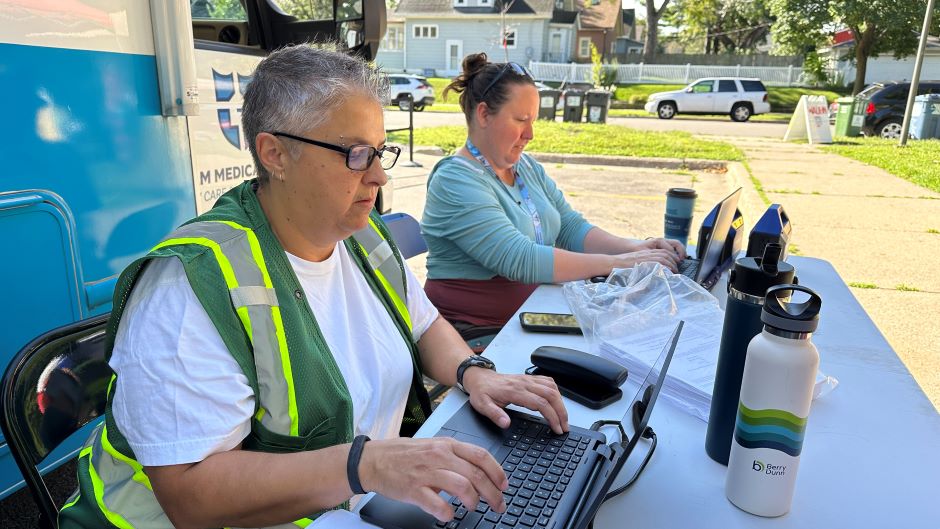


WASHINGTON — The University of Minnesota says it braces every day for an unwelcome notice — that a federal grant it has been awarded for scientific and medical research has been abruptly canceled.
“It’s having a very devastating impact,” said Kimberly Kirkpatrick, the university’s associate vice president for research. “Imagine that you have a whole team … and you’re in the middle of a study and you get a notice that your award is immediately stopped.”
The Trump administration’s termination of more than $12 billion in Health and Human Services grants has wiped out a significant amount of money to Minnesota’s scientific and medical community.
Scientists and medical researchers have had to stop their work after receiving word that it “no longer effectuates agency priorities,” and some have had to fire personnel or even shut down laboratories.
Not only has the pullback of awards disrupted efforts to develop new vaccines and extend vaccinations in the state, but key research into gender and racial health disparities has been terminated. And programs in Minnesota that treat mental health and alcohol abuse and opioid addiction have abruptly ended.
The Trump administration said the claw-back of grants was aimed at reducing federal spending and advancing administration policies. Many grants that were canceled focused on the development of vaccines or research into health disparities in the LGBTQ and minority communities.
For instance, the University of Minnesota lost a grant, in the initial amount of $187,261, to study “the impact of misinformation, mistrust and other psychosocial factors on vaccine hesitancy.” Another grant that was canceled — in the amount of nearly $2.3 million — focused on training for dementia care of sexual and gender minority residents of long-term care facilities.
The university also lost a $2 million HHS award for research into effective methods to recruit sexual and gender minority cancer patients for medical studies. And it lost a $3 million grant to study the health of adolescents who belong to racial and gender minorities and immigrant communities.
An analysis by Nature, a multidisciplinary science journal, determined that 28.7% of the National Institute of Health grants that were canceled were HIV- and AIDS-related and another 24.3% were trans health related.
In most cases, the grants to the University of Minnesota were canceled after the school was able to draw down some of the money, so the full amount of the grant was not lost.
Still, Kirkpatrick said the cancellations have created hardship at the university, which is seeking ways to find other money to continue research that has been derailed. She called the revocation of awards that had been granted “a violation of trust.”
“We think of our awards as contracts,” she said. “We promise the federal government we will do the work and the federal government promises to help pay for it.”
The largest university grant that was terminated was a $67 million award to the schools “Midwest Antiviral Drug Discovery (AViDD) Center,” which is working to develop the next generation of antiviral drugs for pandemic-level viruses, including SARS-CoV-2, Ebola, Lassa and Zika viruses.
But, arguing the COVID pandemic has ended, HHS abruptly cut funding for dozens of studies seeking new vaccines and treatment for COVID-19 and other pathogens that might cause future pandemics.
Twenty-three Democratic attorneys general, including Minnesota Attorney General Keith Ellison, successfully sued to win the temporary release of the funds that were awarded as part of the nation’s effort to combat Covid-19. But the Trump administration is appealing that decision.
The university has also been hurt by the clawback of awards to other universities, including Johns Hopkins in Maryland, with which they collaborate on research.
“The things that are happening at other universities are affecting us a lot,” Kirkpatrick said.
She said the University of Minnesota has modified and appealed the termination of some grants, is lobbying lawmakers for help in pressing HHS to reverse its decisions and joined other universities in efforts to retrieve their grant money.
‘Contrary to federal law’
The state government and dozens of health-care related nonprofits have also been badly hurt by the cutoff of federal funding, as have the state’s tribes.
The Minnesota Department of Human Services said it had lost up to $27.5 million in behavioral health funding meant to serve Minnesotans.
The money from HHS was awarded to about 85 nonprofits, tribes and local governments that combat mental health and addiction problems. Like much of the grant money the University of Minnesota received, the DHS funds were linked to pandemic funds appropriated by Congress.
“The proposed federal elimination of these grants without notice or good cause is contrary to federal law and inconsistent with the United States Department of Health and Human Service’s past statements,” said DHS Assistant Commissioner Teresa Steinmetz in an emailed statement. “Considering this unprecedented situation, DHS cannot predict the actions the administration may take, the legal posture it will adopt, or how the federal courts will ultimately rule.”
Tom Belcher, the grant manager at the Willmar-based Greater Minnesota Family Services, said his organization had received two subgrants, each in the amount of $95,000.
One grant trained therapists embedded in 80 schools across Minnesota on successful methods to help troubled children.
Another allowed the organization to expand its operations. Luckily, Belcher said his nonprofit was able to send most of the HHS money it received through the Department of Human Services before the grants were pulled.
Nevertheless, Belcher said the elimination of the grants “has had a very negative fiscal impact on a lot of programs that may, or may not, continue.”
Meanwhile, the Minnesota Department of Health (MDH) has lost hundreds of millions of dollars in HHS grant money, which it used to run several programs within the department and award subgrants to about 180 subgrantees who work on health-related issues.
DHS Commissioner Brooke Cunningham said one HHS grant, which paid for epidemiological studies and the construction of new labs to prevent and control infectious diseases, was greatly boosted because of the pandemic and then canceled by the Trump administration. It would have “(built) off the lessons that the COVID pandemic painfully taught us,” Cunningham said.

The grant was used for a variety of new programs, including the installation of HVAC systems to protect residents from airborne pathogens and updating the immunization registry for the state. In addition, 95 vaccination clinics that were funded by HHS grant were shuttered.
“Many of those community-based organizations did not just administer vaccines,” said Cunningham. “They were a way for us to address vaccine hesitancy.”
The grant money that was pulled back by MDH was temporarily reinstated by the lawsuit brought by the Democratic attorneys general. That allowed the agency on Tuesday to inform 170 employees, including public health workers and epidemiologists, who received layoff notices because of the funding cuts that they could remain employed for another two weeks.
But the agency is at the mercy of what a court decides and considers the injunction that released the funds a temporary respite.
And some of the nonprofits who partner with the department and whose subgrants were canceled will not be able to resume work.
The Rev. Alfred Babington-Johnson, president and chief executive officer of the Stairstep Foundation, a Minneapolis-based nonprofit focused on responding to issues affecting African Americans through a community-based approach, was forced to halt operations related to COVID-19.

He estimated that Stairstep’s network of African American churches provided tens of thousands of COVID vaccinations throughout the state. More recently, the organization had been working to address the after effects of the pandemic, including providing mental health first aid.
“We actually got a call on a Wednesday in the middle of the month, saying, ‘As of 11 o’clock today, please cease and desist all activities,’” Babington-Johnson said. Stairstep lost, he estimates, around $500,000 to $600,000 in funding as a result of grant cancellation.
Babington-Johnson was also involved in a small MDH panel reaching out to various communities regarding the effects of long COVID, including his own African American community. The work of this panel, which would have helped better understand long-term effects of contracting COVID -19, has also been halted.
While Babington-Johnson said that the effects of this loss in funding were “to be determined,” he said this cut in funding was disruptive, chaotic and demonstrated a “lack of compassion.”
The post Health grant cuts upend medical research, mental health and addiction services in Minnesota appeared first on MinnPost.















































